- Home
- John Bellairs
The Curse of the Blue Figurine Page 5
The Curse of the Blue Figurine Read online
Page 5
Johnny knew that the old woman was really Father Baart, but for some reason he was not afraid. He said calmly, "I have come here to search for the answer to the mysteries of life."
The old woman grinned—Johnny could see her wrinkled mouth and strong, jutting chin below the shade. "Come around behind the counter, then," she barked. "Step this way, step right this way...."
Johnny moved around behind the counter, and he saw —to his horror—that the old woman was standing in an open grave. Behind her was a gravestone, and all around was long, matted grass. Johnny tried to turn and run, but his legs were like lead. The old woman had hold of his hand now, and she was pulling him down. He struggled. He planted his feet and tried to resist, but the old woman's grip was like an iron vise. The harder Johnny pulled, the closer he got to the grave. His feet were sliding, inch by inch, to the brink. And now he saw that the woman's face was a skull, a horrible grinning skull covered with black crisscrossed strands of spider web. Johnny was screaming, but he couldn't hear any sound. And now he was plunging down, down...
With a sudden jolt Johnny woke up. He was trembling all over. Was there anyone in the room? No, no one that he could see. The room was dark and quiet. From far away came the steady rattling roar of a freight train that was passing through the town. Johnny lay down and pulled the covers up over himself. But it was a long time before he could get to sleep again.
The next morning at breakfast Johnny was unusually thoughtful. Also his appetite was gone. He only ate a few spoonfuls of Gramma's delicious oatmeal (served with brown sugar, maple syrup, and raisins). Gramma asked him if he had something on his mind, and, lying, he said no. He just couldn't tell her, because he was thinking about the blue figurine. How would she feel if she knew he had swiped that gizmo from the church? Johnny had a pretty good idea of how she would feel. So he said nothing.
The school day passed in its usual way, except that Johnny was in a fog. He was usually quite alert and raised his hand a lot, but not today. In fact he got bawled out a couple of times by Sister Electa because he was not paying attention. Johnny was thinking about the spooky things that had happened to him lately. He was wondering if there was any connection between them and the blue figurine. He could not get Father Baart's grim warning out of his mind: Whoever removes these things from the church does so at his own peril. I abjure you by the living God not to endanger your immortal soul. Vengeance is mine; I will repay, saith the Lord. Was this warning just craziness, or was there something more to it? By the time school was over for the day, Johnny had made up his mind: He would have to see the professor about all this.
That evening, after dinner, Johnny went across the street to see his friend. He had called the professor up, and the professor had said sure, come ahead, he would be up in the bathroom sailing boats in the tub! Johnny did not know what to think of this, but he had learned to expect the unexpected from Professor Childermass. When he arrived at the door of the professor's bathroom, he found the old man kneeling beside the tub. He was wearing a rubber waterproof apron, and the sleeves of his shirt were rolled up. The tub was half full of water, and in it floated a fleet of little wooden boats. They were galleys, with matchstick oars and little triangular sails. Little paper flags fluttered from the sterns of the ships. Half of the flags were red and gold and had coats of arms on them. The other half were green and had gold crescents. The professor explained that he was reenacting the Battle of Lepanto, which had taken place in 1571. In it the Christian ships led by Don John of Austria had defeated the ships of the Turks. With a little book open in his left hand and a stick held in his right the professor moved the ships around. When a ship got taken or sunk, the professor would reach in and lift it out of the water and put it on a shelf over the tub. Next to the tub was a blackboard where the professor kept score. The scoreboard looked like this:
"Now then," said the professor as he pushed two boats together, "what did you want to see me about?"
Johnny told him. He explained about the spiders and the feeling of being followed that he had had the other night, and about the dream. The professor listened thoughtfully while Johnny talked, but he did not seem particularly worried.
"Is that all?" said the professor when Johnny was through. "I mean, is that all that's got you worried?"
Johnny felt offended. Here he was trying to tell the professor his troubles, and what he was getting in response was Ho, hum, is that all? "I... I thought you'd tell me what to do," said Johnny in an offended voice.
Immediately the professor saw that he had hurt Johnny's feelings. He hadn't meant to. Now he heaved a deep, dispirited sigh. He stood up and started untying the strings of his apron. "Look, John," he said slowly, "I am not trying to make light of your worries. But I do think this whole business is in your mind. Spiders can find places to live and hatch their eggs in an old house even in wintertime. As for your dream and your feeling that you were followed... well, the power of suggestion is pretty strong. You heard my ghost story—which, by the way, I wish I had never, ever told you—and then you found that dratted hunk of blue crockery. You've got Father Baart and ghosts on the brain, my boy, and that's why you've got the heebie-jeebies these days. And do you know what I suggest as a cure? Hmmm?"
Johnny shook his head. "I dunno, Professor. What?"
The professor paused dramatically. He folded up his apron and put it away in the bathroom closet. Then he turned back to Johnny, rubbing his hands and grinning hugely. "I would suggest," he said, "that you let me beat the holy bejesus out of you in a chess game or two, and that you then eat a huge, glutty, calorie-filled hunk of my delectable prune cake, with creamy smooth chocolate frosting, and whipped cream on top. How's that for a prescription? Eh?"
Johnny liked the idea. His little visit to the professor turned into a long and enjoyable—and filling—stay. When he went home that evening, he felt that maybe the professor was right after all. The whole business was just his imagination working overtime.
A month passed. Windy March turned into sloppy wet April, and—much to Gramma's annoyance—the spiders came back to 23 Fillmore Street. On the other hand the spooky feelings and dreams that had been bothering Johnny went away. And one evening, when he was down at the library, Johnny picked up the new April issue of Hobbies and saw that his question had been answered. This was the answer:
We have consulted antique dealers in the city of Cairo, Illinois, and we have discovered that mummy-shaped souvenir figures were sold in that city late in the nineteenth century. They were made in three colors, gold, blue, and red, and they were manufactured by Mound City Novelties of St. Louis, Missouri. We are informed that such an object, in good condition, would be worth about $25 today.
Johnny closed the magazine and shook his head. Twenty-five dollars! Phooey. So much for his wonderful dream of getting rich in a hurry. But at least now he knew that the figurine was not some mysterious talisman from ancient Egypt. It was what the professor had said it was. Johnny felt very relieved, and once again he scolded himself for letting his imagination work overtime.
Toward the end of April St. Michael's School had its yearly paper drive. At St. Michael's it was turned into a big contest, the east side of the school against the west side. Sister Electa made up a song set to the music of "The Sidewalks of New York," and all the kids sang it in class:
East Side, West Side,
Which is going to win?
We're looking for the paper
In cellar, barn, and bin,
Boys and girls together
Working one and all,
Bringing loads of paper
From the sidewalks of our town!
Every day for three days the students of St. Michael's School were let out of class in the afternoon so they could go hunt for wastepaper. They went everywhere looking for it. Some kids went from house to house. Others—the cleverer ones—had aunts and uncles who had been saving newspapers for them all year. Now they gleefully lugged the bales in, tied up nice and neat. For the k
ids it was like a holiday. And it was a contest too— each side was fighting hard to win.
On the last day of the paper drive Johnny and a lot of other kids were over at the Parish Hall, working hard. The Parish Hall was a long red brick building that stood just to the west of the school. This was where the Friday-night bingo games were held. At paper drive time all the folding chairs and tables were stacked over on one side of the hall, and the bundles of tied newspapers lay in big heaps. Kids swarmed everywhere, and everybody was supposed to have something to do: Some kids tied loose paper into bundles, others counted the bundles, and still others helped unload paper from the flatbed trucks that backed up to the open freight door. Everybody worked, and everybody seemed to enjoy working. It was such a treat to be doing something besides school-work for a change!
On into the late afternoon Johnny toiled. He got paper cuts and twine burns on his fingers, and his shirt was soaked with sweat, but it didn't matter. He was working to help the east side of St. Michael's School win. Johnny was weary but happy. At last he felt like he belonged at St. Michael's School.
Around three thirty the Parish Hall began to empty out. Kids started to go home in ones and twos and threes. Johnny was still busy tying bundles. Then he heard somebody cough over his head. He looked up and saw that it was Sister Correda. Sister Correda was the first-and second-grade teacher. She was nice, but she was kind of scatterbrained. She was always forgetting where she left things.
"Uh... John?" she said in her hesitant way. Sister Correda always acted apologetic when she was about to ask a favor of somebody.
"Yes, Sister?"
"Would you please go over to the school and get my watch for me? I must have left it on the desk in my classroom."
"Sure, Sister. I'll be right back."
Johnny went out the door into the afternoon sunlight. He crossed a corner of the playground and climbed the concrete steps that led to the back door of the school. Now he was inside again, in the cool gloom of the building, which always smelled of varnish and chalk dust and library paste. Johnny went straight to the first-grade room. He opened the door and peered inside. There on the teacher's desk lay Sister Correda's watch. It was a silver-plated pocket watch, with a long braided piece of leather attached to it. And standing next to the desk with his hand reaching out toward the watch was Eddie Tompke.
As soon as Eddie saw Johnny, he jerked his hand back. Then he grinned nastily.
"Hello, Brown Nose," he said. "You're just in time. I was gonna take this watch over to Sister What's Her Name. Now you can save me a trip."
Johnny stood dead still, staring at Eddie. I bet you were gonna take the watch over to Sister, thought Johnny. I just bet you were.
Eddie glared right back at Johnny. His eyes were mean and hard. " 'Smatter, Brown Nose? Doncha believe me? Think I'm lyin' to ya? Huh?"
Johnny didn't know what to say. He was scared of Eddie, but he stood his ground. He wasn't going to run away. "You're not s'posed to be in here," he said in a strained, nervous voice. "If the sisters find out—"
"Well, the sisters won't find out unless you tell 'em, will they, Brown Nose? C'mon and get the watch. You scared to come and get it?"
Johnny felt the muscles in his stomach tighten. He wanted to turn and run. But he forced himself to walk forward to the desk. Now he was standing face-to-face with Eddie. For a second Johnny thought that he would have to fight Eddie to get the watch. But Eddie pulled his hand back as Johnny approached.
"Brown noses always run errands for the sisters, don't they?" said Eddie in a hateful, crooning voice. "That's how they get their good grades. Everybody ought to know that."
At this something inside Johnny snapped. Eddie was bigger and stronger than he was, but he just had to say something. Johnny looked at Eddie, and their eyes met. "I'm not a brown nose," he said evenly. "I just do my work."
For some reason this remark really seemed to make Eddie angry. Quick as a flash he reached out and grabbed Johnny's hand. With his other hand Eddie picked up something that lay on the desk. It was a kid's pair of scissors. Eddie reached out and clamped the scissors around the index finger of Johnny's hand. The finger was caught in the part of the scissors just above the rivet that held the two blades together. Eddie squeezed. It felt awful— it was like being tortured. Johnny bit his lip to keep from yelling. He didn't want to give Eddie the satisfaction of hearing him scream.
Eddie kept squeezing. Tears were in Johnny's eyes. Weakly he tried to shove Eddie away. At last Eddie let go. He dropped the scissors on the desk and said, "See you 'round, Brown Nose." Then he turned on his heel and left.
Johnny stood at the desk. He was crying and clutching his injured finger. It burned, it stung. Slowly the hurt began to go away. Johnny took off his glasses and wiped his eyes with his handkerchief. Then he put the glasses back on again and picked up the watch. Sister Correda would be wondering why it had taken him so long. He wanted to tell her what had happened, but he knew he wouldn't tell on Eddie. That was for tattle-taling babies, not for him.
Johnny went back to the Parish Hall and gave Sister Correda her watch. As soon as she saw him she knew something had happened. His face was red and streaked with tears, and he was sniffling.
Sister Correda was the flustery type, and she immediately got upset. "Good grief, John!" she exclaimed. "What... what happened to you?"
Johnny had a powerful urge to tell on Eddie, but he resisted. "I... I caught my hand in the door to your room," he said. And as proof he held up his sore and reddened finger.
Sister Correda was properly sympathetic. She took Johnny over to the sisters' house and put Unguentine on his finger. She gave him a glass of milk and a couple of Oreo cookies, and then she told him that he probably ought to quit working and go home. He wouldn't be able to tie up any bundles with his sore finger, and anyway it was about time to call it quits for the day.
"Besides, it looks as if your side has won," said Sister Correda, smiling. "That ought to make you feel good. And thank you for all the work you did. You're a real trouper—you never give up!"
Compliments always made Johnny feel shy. "It was a lotta fun," he said, staring at the tablecloth.
Johnny talked a bit more with Sister Correda, and then he set out for home. At first as he walked along he felt good. His finger wasn't hurting much anymore. And he was very, very proud that his side had won the paper drive. But slowly the good feeling began to die away, and black anger took its place. Who did Eddie think he was, anyway? And what had he, Johnny, ever done to him? Nothing. Nothing except get good grades in school. And for this Eddie hated him. Well, right now Johnny was hating him back. He wanted to strangle Eddie, he wanted to murder him. In his mind's eye he saw himself pushing Eddie in front of cars, or beating him bloody in a boxing match. By the time Johnny got home, he was fairly tingling with hatred of Eddie.
Straight in the front door Johnny marched. Straight in the door and up the stairs to his room. He slammed the door of his room and threw the bolt. And then he did a very strange thing. He went to the closet, opened the door, and knelt down. Carefully he removed the sweat shirts and blankets and copies of Boys' Life that were piled on top of the black book. He opened the cover and took out the blue figurine. Then he clenched the thing tight in his hands and yelled at the top of his voice, "I hope he breaks his goddam neck!"
Johnny was silent. His face felt flushed, and he was breathing hard, and his heart was going like a triphammer. He felt scared. Scared of himself, scared of his anger, scared of what he had just said. And why was he holding the figurine? He had no idea why—no idea in the world.
With trembling hands Johnny put the figurine back in the book. He closed the worn, dog-eared cover, and he was about to start piling blankets on when he heard a knock at the door. Hastily Johnny threw stuff on top of the book. He got up and closed the closet door. Then he went to the door of his room and opened it. There stood Gramma. Her arms were folded, and she looked mad.
"John Dixon," she said severely,
"I would like to know who gave you the right to come tearin' in here the way you did just now. When I heard your door slam, I thought the house was comin' down on top o' me! What's the matter with you, anyway?"
Johnny looked remorseful and stared at the floor. "Aw, I got in a fight with Eddie Tompke," he muttered. "He hurt my finger, and I got real mad. That's all."
Gramma looked a little less grim when she heard about Johnny's finger. "I know those Tompkes," she said, nodding meaningfully. "They're a mean bunch, all of 'em. Old Jack Tompke, he belonged to the Ku Klux Klan. Did you know that?"
Johnny said no, he didn't know that.
"Well, he did. Could I have a look at your finger?"
Johnny held out his hand. Gramma winced and made a tsk-tsk sound. "How'd he do that to you?" she asked.
"He caught it in a pair of scissors."
Gramma made more clucking sounds and shook her head. "Well, like I said, they're a mean bunch. Come on downstairs, and I'll put some witch hazel on that. It'll make it feel better."
So Johnny went downstairs with Gramma, and for the second time that afternoon he got his finger doctored. As Gramma fussed over him she went on about the Tompkes and their relations, the Tadmans and the Sweets and the Schemanskes. Gramma was like that. She had lived in Duston Heights all her life, and she knew everything about everybody. Usually this kind of thing bored Johnny, but right now he was happy that Gramma had the Tompkes to think about. It would make her forget about this door-slamming.
Later Johnny did some KP work in the kitchen for Gramma. He set the table for dinner, and he washed the celery, and he peeled some potatoes. But as he worked shapeless dark fears came crowding into his mind. Had he done something awful by grabbing the figurine and saying what he had said? If the professor knew about his fears, he would laugh and say that Johnny was letting his imagination run hog-wild. And it was certainly true that the figurine was just a souvenir and nothing more. The stories about Father Baart were just stories—that was also true, beyond doubt.

 The Curse of the Blue Figurine
The Curse of the Blue Figurine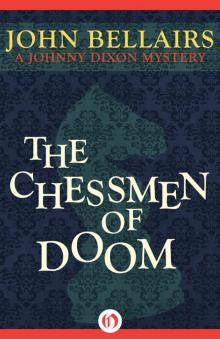 Chessmen of Doom
Chessmen of Doom Secret of the Underground Room
Secret of the Underground Room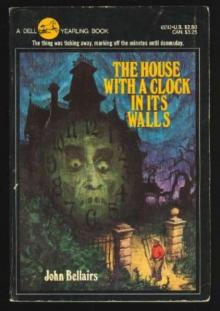 The House With a Clock in Its Walls
The House With a Clock in Its Walls The Vengeance of the Witch-Finder
The Vengeance of the Witch-Finder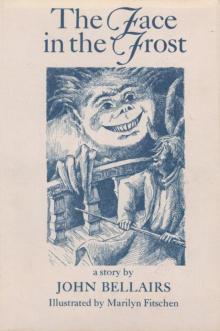 The Face in the Frost
The Face in the Frost Revenge of the Wizard's Ghost
Revenge of the Wizard's Ghost Spell of the Sorcerer's Skull
Spell of the Sorcerer's Skull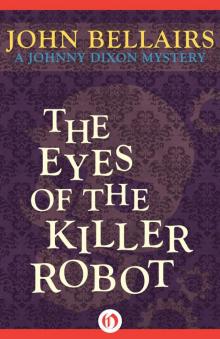 Eyes of the Killer Robot
Eyes of the Killer Robot Mummy, the Will, and the Crypt
Mummy, the Will, and the Crypt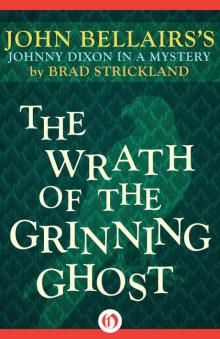 Wrath of the Grinning Ghost
Wrath of the Grinning Ghost The Mansion in the Mist
The Mansion in the Mist The Doom of the Haunted Opera
The Doom of the Haunted Opera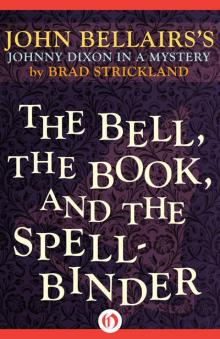 The Bell, the Book, and the Spellbinder
The Bell, the Book, and the Spellbinder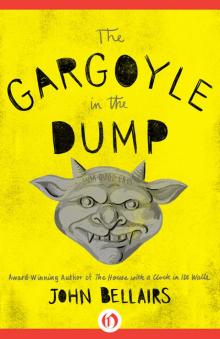 The Gargoyle in the Dump
The Gargoyle in the Dump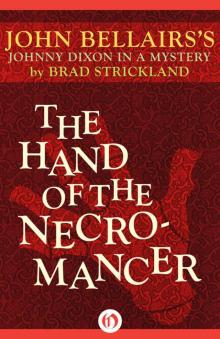 The Hand of the Necromancer
The Hand of the Necromancer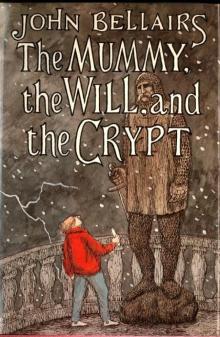 The Mummy, the Will, and the Crypt
The Mummy, the Will, and the Crypt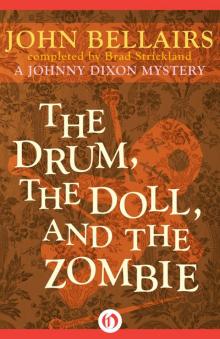 Drum, the Doll, and the Zombie
Drum, the Doll, and the Zombie The Specter from the Magician's Museum
The Specter from the Magician's Museum The Letter, the Witch, and the Ring
The Letter, the Witch, and the Ring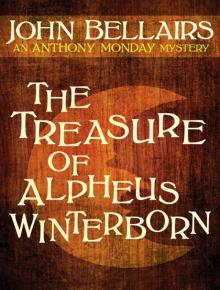 The Treasure of Alpheus Winterborn
The Treasure of Alpheus Winterborn The Dark Secret of Weatherend
The Dark Secret of Weatherend The Figure in the Shadows
The Figure in the Shadows